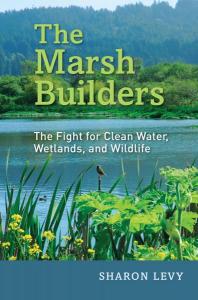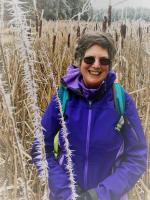Sharon Levy: The Marsh Builders
For this column, NASW book editor Lynne Lamberg asks NASW authors to tell how they came up with the idea for their book, developed a proposal, found an agent and publisher, funded and conducted research, and put the book together. She also asks what they wish they had known before they began working on their book, what they might do differently the next time, and what tips they can offer aspiring authors. She then edits the A part of that Q&A to produce the author reports you see here.
Publication of NASW members’ reports in Advance Copy does not constitute NASW’s endorsement of their books. NASW welcomes your comments, and hopes this column stimulates productive discussions.
THE MARSH BUILDERS:
THE FIGHT FOR CLEAN WATER, WETLANDS, AND WILDLIFE
Sharon Levy
Oxford University Press, May 17, 2018, $39.99
ISBN-10: 0190246405; ISBN-13: 978-0190246402
Levy reports:
The marsh in the small northern California city of Arcata teems with life: river otters, frogs, ducks, falcons. This idyllic habitat also filters sewage. It exists because of a citizen uprising against high-tech, energy intensive sewage treatment systems mandated in the early years of the Clean Water Act. Powered by sun and wind, Arcata’s pioneering project has inspired treatment wetlands around the world.
Soon after I moved to Arcata in 1994, I began writing magazine articles about the marsh. I wrote a book proposal, but it never found a home. Publishers were unwilling to commit to a book about the ecology of sewage. Though locals involved in the 1970s political fight with state regulators recall that time as a life-altering struggle, publishers wanted more drama. I put my marsh book proposal aside, continued freelancing, and published a different book with Oxford (Once and Future Giants, 2011).In 2014, I dug out my old notes and revisited the marsh proposal in light of contemporary water pollution controversies. Oxford accepted my revised proposal. The marsh became a portal that led me through the histories of water pollution and wetlands destruction. The book explores the need for constructed wetlands to combat nutrient pollution from farm runoff and heal the dead zones it creates, the wildlife ecology of manmade wetlands, the rebuilding of coastal wetlands to defend against sea level rise — and the daunting political obstacles to restoration.
The book I’ve just finished goes deeper into humanity’s quirky relationship with wetlands than any book I could have written back in the 90s. My advice for aspiring authors is to do a book when you’re passionate about the subject, and to be patient. Once you land a contract, find article assignments that help to build the book. This can cover some travel costs and compensate for the petite size of most book advances.
Contact info:
- Sharon Levy, 707-499-6849, sharon@sharonlevy.net, https://www.sharonlevy.net/, @SharonLevywrite
- Book website: http://bit.ly/2ovS78q
- Publicist: Beth Bauler, 212-726-6452, Beth.Bauler@oup.com
NASW members: will your book be published soon? Take advantage of this opportunity for shameless self-promotion. Submit your report for Advance Copy.
Tell your fellow NASW members how you came up with the idea for your book, developed a proposal, found an agent and publisher, funded and conducted research, and put the book together. Include what you wish you had known before you began working on your book, or had done differently.
See https://www.nasw.org/advance-copy-submission-guidelines.
Thinking of writing a book? If you are a NASW member, you may access a list of more than 150 books and online resources to help you craft your book proposal, find an agent and funding sources, negotiate your contract, learn about self-publishing, publicize and market your book, and more at https://www.nasw.org/article/write-book.
Send book info and questions about book publishing to Lynne Lamberg, NASW book editor, llamberg@nasw.org.





